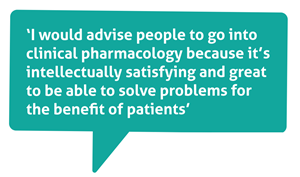Clinical pharmacologists are doctors who specialise in clinical pharmacology and therapeutics (CPT) after medical school. Their core goal is to improve patient care through the safe and effective use of medicines. If you are planning to apply to medical school, you might want to explore pharmacology during your degree to see if it is an area you would like to specialise in later.
Learning about pharmacology at medical school
At medical school you will learn all about medicines, how they work, the reasons for taking them and potential side effects.
Depending on your course, pharmacology may be taught as dedicated modules or be integrated. Many medical schools will encourage you to take intercalated degrees - this means taking time out of your regular medical degree to study a specific area of interest, such as pharmacology.
Pharmacology is in everything that medics do. Even the healthiest surgical patient requires anaesthetic, pain killers and antibiotics. Medics can only offer the best care by combining their knowledge of the patient, their physiology, pathology and pharmacology.
A typical medical pharmacology course will cover:
- The science behind how common medicines work

- Useful principles to help you learn about drugs
- Development and monitoring of new drugs
- The side effects of drugs medics use
- The basics of pharmacology
- The principles of clinical pharmacology
- Prescribing medicines in practice
- How to choose a drug, dose, route of administration, and how to prescribe it
Pharmacology is often a topic that brings many aspects of medicine together. It can teach you:
- Mechanism of drug action – how the body works and what causes a disease.
- Therapeutics – the different approaches to treating a disease
- Learning to prescribe – how to administer medicines
You can explore pharmacology while studying for your medical degree by doing:
- Clinical placements
- Electives
- Summer jobs and part-time work in laboratories
- Getting involved in clinical audits
Find out more about Life as a Medical Student on the Royal College of Physicians website and about NHS Health Careers.
Learn more about Specialising in Clinical Pharmacology following an medical degree.